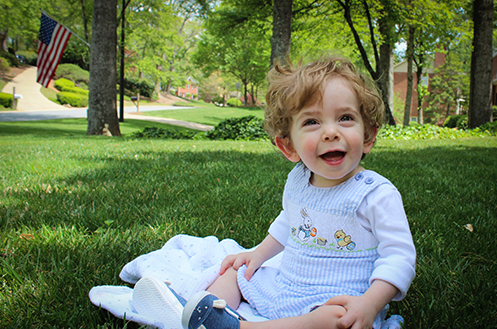Just before Phoebe Harrington and Ben Dumas were due to take their second son home from the hospital, nurses heard something worth flagging—a slight murmur in their baby’s heart. Murmurs aren’t uncommon in newborns, but it worried Phoebe. When she was six months pregnant, she’d lost her brother to a sudden heart attack. This baby, Robert Benjamin, or “Benji,” was named after him.
Because of Phoebe’s family history, Benji’s pediatrician referred them to Sibley Heart Center at Children’s. “Everything looked OK at first,” said Phoebe. But in the final hour of the five-hour-long appointment, an echocardiogram revealed that Benji had two holes in his heart: an atrial septal defect and a ventricular septal defect.
“If there’s one thing I learned early on, it’s that babies needing heart care are unpredictable,” said Phoebe. Benji didn’t feed well, and his heart rate was the same as someone running a marathon—fast enough for his rapid breathing to cause his Rock ‘n Play sleeper to move.
When Benji was almost 3 months old and still only 9 pounds, it was time. “Other than my brother’s funeral, seeing the anesthesiologist carry off my baby to surgery was the hardest moment of my life,” said Phoebe. “You just have to hope and pray that he comes back.” Benji’s surgeon, Subhadra Shashidharan, MD, called hourly with progress updates. The surgery went well, and Phoebe felt comforted by the one-on-one attention of the nurses in the Cardiac Intensive Care Unit. “I asked a billion questions and they answered every single one.”
After just 24 hours, Benji was smiling and alert. Tubes and wires began coming off. “You could see his little personality coming back,” recalled Phoebe. After another two days in the Cardiac Step-down Unit, Phoebe and Ben took their baby home. “I went out of there with a love for Children’s—not just for the nurses and doctors who cared for Benji—but for all the people we encountered,” said Phoebe.
Benji started gaining weight and learned to stick up for himself when playing with his big brother, Henry, who calls Benji’s scar his “booboo.” He became just like any other baby—even a bit more adventurous than most.
A year to the day after the first surgery, the family learned that a growth over Benji’s mitral valve, an issue they’d been monitoring for months, was placing too much pressure on his blood flow. He’d have to have a second surgery to remove it. “I remember Benji’s wonderful cardiologist, Dr. William Border, telling me that Benji can feel this, he just can’t express it because he’s only 1 year old,” said Phoebe. “He explained that Benji feels held back and frustrated that he can’t do everything he wants to do.”
Four days after another successful surgery with Dr. Shashidharan, the family was home, with Phoebe trying to keep her unstoppable toddler out of trouble long enough to heal for good. “We have regular visits with Benji’s pediatrician, Dr. Daniel Heine, and I’m in such a better place than I was a year ago,” she said. “It finally feels like things are getting better, and my heart goes out to Children’s for keeping Benji healthy.”

